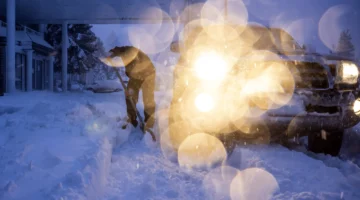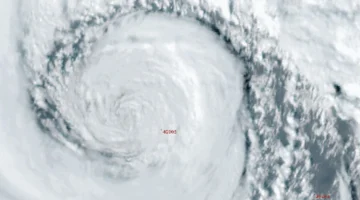Science Says: Record heat, fires worsened by climate change
By SETH BORENSTEIN and FRANK JORDANS , Associated Press
Heat waves are setting all-time temperature records across the globe, again. Europe suffered its deadliest fire in more than a century, and one of nearly 90 large fires in the U.S. West burned dozens of homes and forced the evacuation of at least 37,000 people near Redding, California. Flood-inducing downpours have pounded the U.S. East this week.
It’s all part of summer — but it’s all being made worse by human-caused climate change, scientists say.
“Weirdness abounds,” said Rutgers University climate scientist Jennifer Francis.
Japan hit 106 degrees on Monday, its hottest temperature ever. Records fell in parts of Massachusetts, Maine, Wyoming, Colorado, Oregon, New Mexico and Texas. And then there’s crazy heat in Europe, where normally chill Norway, Sweden and Finland all saw temperatures they have never seen before on any date, pushing past 90 degrees. So far this month, at least 118 of these all-time heat records have been set or tied across the globe, according to the National Oceanic and Atmospheric Administration.
The explanations should sound as familiar as the crash of broken records.
“We now have very strong evidence that global warming has already put a thumb on the scales, upping the odds of extremes like severe heat and heavy rainfall,” Stanford University climate scientist Noah Diffenbaugh said. “We find that global warming has increased the odds of record-setting hot events over more than 80 percent of the planet, and has increased the odds of record-setting wet events at around half of the planet.”
Climate change is making the world warmer because of the build-up of heat-trapping gases from the burning of fossil fuels like coal and oil and other human activities. And experts say the jet stream — which dictates weather in the Northern Hemisphere — is again behaving strangely.
“An unusually sharply kinked jet stream has been stuck in place for weeks now,” said Jeff Masters, director of the private Weather Underground. He says that allows the heat to stay in place over three areas where the kinks are: Europe, Japan and the western United States.
The same jet stream pattern caused the 2003 European heat wave, the 2010 Russian heat wave and fires, the 2011 Texas and Oklahoma drought and the 2016 Canadian wildfires, Pennsylvania State University climate scientist Michael Mann said, pointing to past studies by him and others. He said in an email that these extremes are “becoming more common because of human-caused climate change and in particular, the amplified warming in the Arctic.”
Climate scientists have long said they can’t directly link single weather events, like a heat wave, to human caused climate change without extensive study. In the past decade they have used observations, statistics and computer simulations to calculate if global warming increases the chances of the events.
A study by European scientists Friday found that the ongoing European heat wave is twice as likely because of human-caused global warming, though those conclusions have not yet been confirmed by outside scientists. The World Weather Attribution team said they compared three-day heat measurements and forecasts for the Netherlands, Denmark and Ireland with historical records going back to the early 1900s.
“The world is becoming warmer and so heat waves like this are becoming more common,” said Friederike Otto, a member of the team and deputy director of the Environmental Change Institute at the University of Oxford.
Erich Fischer, an expert on weather extremes at the Swiss Federal Institute of Technology in Zurich who wasn’t part of the analysis said the authors used well-established methods to make their conclusions.
Georgia Tech climate scientist Kim Cobb said the link between climate change and fires isn’t as strong as it is with heat waves, but it is becoming clearer.
A devastating fire in Greece — with at least 83 fatalities — is the deadliest fire in Europe since 1900, according to the International Disaster Database run by the Centre for the Research on the Epidemiology of Disasters in Brussels, Belgium.
In the United States on Friday, there were 89 active large fires, consuming nearly 900,000 acres, according to the National Interagency Fire Center. So far this year, fires have burned 4.15 million acres, which is nearly 14 percent higher than average over the past 10 years.
The first major science study to connect greenhouse gases to stronger and longer heat waves was in 2004. It was titled “More intense, more frequent and longer lasting heat waves in the 21st century.” Study author Gerald Meehl of the National Center for Atmospheric Research said Friday that now it “reads like a prediction of what has been happening and will continue to happen as long as average temperatures continue to rise with ever-increasing emissions of greenhouse gases from burning fossil fuels. It’s no mystery.”
___
Borenstein reported from Washington, Jordans from Berlin.
[livemarket market_name="KONK Life LiveMarket" limit=3 category=“” show_signup=0 show_more=0]









“Japan hit 106 degrees on Monday, its hottest temperature ever.
Technically the hottest temps recorded in Japan occurred on 6 August 1945 and 9 August 1945.
“The temperature of the atomic bomb of hiroshima was 300,000 degrees centigrade.”
Real doom and gloom….
“Climate change is making the world warmer because of the build-up of heat-trapping gases from the burning of fossil fuels like coal and oil and other human activities.”
Would someone please tell me what should be the “ideal” earth temperature so I know whether we are behind or ahead?
Because here is the dilemma:
Ions ago per legitimate scientific research including ice core sampling (look it up), Greenland was green; Antarctica was lush; and London was a tropical forest.
Maybe we should embrace “climate change” and get back to the past!
“nearly 90 large fires in the U.S. West burned dozens of homes and forced the evacuation of at least 37,000 people near Redding, California.”
Golly gee wiz..forest fires in the west. Imagine that. Unless you’ve been hibernating, this is an annual event dating back to 1845 (records).
How about this:
Much of the land in western states is federally owned. Recall Reagan “I’m from the government and I’m here to help.”. So this is “climate change”! No it’s federal management or lack of the management on federal lands specifically the forests:
• Can’t log trees off federal lands with rare exception.
• Gotta protect endangered species by not logging but at least the fires will wipe them out
• There is no management of federal forests and undergrowth keeps piling up.
• Can’t salvage log trees after a fire so in 3-5 years the fires return but hotter; never mind infestation.
• In reality, federal tress have no financial value as they can’t be logged. Yes they have an intrinsic value but like art, in the eye of the beholder.
Oh the fires…go to Wiki and type “List of Wildfires”…some memorable ones…the late 1800s appear to have significant weather events in the USA…oh yea Climate Change…
• 1910 Great Fire of 1910 (3,000,000 acres; 86 dead
• 1881 Thumb Fire (1,000,000 acres, more than 200 dead)
• 1871 Great Michigan Fire (1,000,000 acres); 1871 Peshtigo Fire (1,200,000 acres, 1500-2500 dead), all 3 linked 1871 Great Chicago Fire (300 dead)